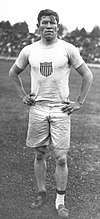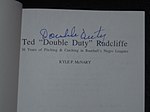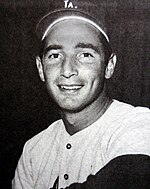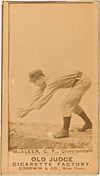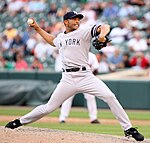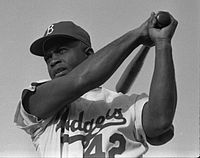Portal:Baseball/Selected biography
| This Wikipedia page has been superseded by Portal:Baseball and is retained primarily for historical reference. |
| Note: Article entries are now being transcluded directly on the main portal page. However, this page should be retained for historical reference. |
The Selected biography box on the portal chooses one of the following at random when displaying the page. Follow the instructions below for adding or nominating a new biography to the list.
Usage
[edit]Baseball related Featured articles can be added directly to this list without nomination. All other articles should be nominated first to ensure that we only display our best work on the portal. The procedure for nomination is at the bottom of this page.
Template
[edit]{{Portal:Baseball/Selected biography/Layout
|image=
|size=
|caption=
|text=
|link=
}}<noinclude>
[[Category:Baseball portal selected biographies|{{SUBPAGENAME}}]]
</noinclude>
Note that the prefix Image: is not required when using this template, also - the template will auto-wikilink the article entered in the link= field. Further information on this template can be found at Portal:Baseball/Selected biography/Layout.
Selected biography list
[edit]1 - 22
[edit]Portal:Baseball/Selected biography/1
Fred Clarke (October 3, 1872 – August 14, 1960) was a Hall of Fame Major League Baseball player from 1894 to 1915 and manager from 1897 to 1915. A Hall of Famer, Clarke played for and managed both the Louisville Colonels and Pittsburgh Pirates. He was a left fielder and left-handed batter.
Of the nine pennants in Pittsburgh franchise history, Clarke was the player-manager for four of them. He and fellow Hall of Famers, Honus Wagner and Vic Willis, led Pittsburgh to a victory over Ty Cobb and the Detroit Tigers in the 1909 World Series. Clarke batted over .300 in 11 different seasons. His 35-game hitting streak in 1895 was the second-longest in major league history at the time and is still tied for tenth-longest. For six years, Clarke held the major league record for wins by a manager.
Portal:Baseball/Selected biography/2 Morris "Moe" Berg (March 2, 1902 – May 29, 1972) was an American catcher and coach in Major League Baseball who later served as a spy for the Office of Strategic Services during World War II. Although he played 15 seasons in the major leagues, almost entirely for four American League teams, Berg was never more than an average player, usually used as a backup catcher, and was better known for being "the brainiest guy in baseball" than for anything he accomplished in the game. Casey Stengel once described Berg as "the strangest man ever to play baseball". A graduate of Princeton University and Columbia Law School, Berg spoke several languages and regularly read 10 newspapers a day. His reputation was fueled by his successful appearances as a contestant on the radio quiz show Information, Please! in which he answered questions about the derivation of words and names from Greek and Latin, historical events in Europe and the Far East, and ongoing international conferences. As a spy working for the government of the United States, Berg traveled to Yugoslavia to gather intelligence on resistance groups the U.S. government was considering supporting. He was then sent on a mission to Italy, where he interviewed various physicists concerning the German nuclear program. After the war, Berg was occasionally employed by the OSS's successor, the Central Intelligence Agency, but, by the mid-1950s, was unemployed. He spent the last two decades of his life without work, living with various siblings.
Portal:Baseball/Selected biography/3
Nicholas James Adenhart (August 24, 1986 – April 9, 2009) was an American right-handed baseball starting pitcher who played two seasons in Major League Baseball (MLB) for the Los Angeles Angels of Anaheim. In four career games, Adenhart pitched 18 innings and posted a win-loss record of 1–0, with nine strikeouts and a 6.00 earned run average (ERA).
A graduate of Williamsport High School, Adenhart was highly touted as a high school prospect until an injury in his final game required Tommy John surgery. He was drafted by the Angels in the 14th round of the 2004 Major League Baseball Draft, and began playing in their minor league system after the surgery was a success. He spent three full years in the minor leagues before making his major league debut on May 1, 2008. After appearing in three games, Adenhart spent the rest of 2008 in the minor leagues developing his skills, and in 2009 he earned a spot in the Angels' starting rotation.
Just after pitching his first start of 2009, Adenhart was killed in a car accident by a drunk driver. Both the Angels and the Salt Lake Bees, for whom Adenhart played in 2008, suspended their next games. There were many tributes to him over the course of the season, including his former teammates spraying champagne and beer on one of his jerseys after they clinched the 2009 American League West division championship.
Portal:Baseball/Selected biography/4
Jim Thorpe (May 28, 1888 – March 28, 1953) was one of the most versatile and accomplished athletes in modern sports. He won Olympic gold medals in the pentathlon and decathlon, starred in college and professional football, played Major League Baseball and also had a career in basketball. He subsequently lost his Olympic titles when it was found he had played two seasons of minor league baseball prior to competing in the games (thus violating the amateur status rules). In 1983, thirty years after his death, his medals were restored.
Thorpe signed with the New York Giants in 1913 and played sporadically as an outfielder for three seasons. After missing the 1916 season, he again played for the Giants in 1917, but was sold to the Cincinnati Reds early in the season. In the "double no-hitter" between Fred Toney of the Reds and Hippo Vaughn of the Chicago Cubs, Thorpe drove in the winning run in the 10th inning. Late in the season, he was sold back to the Giants. In 1919, Thorpe was traded to the Boston Braves for Pat Ragan. In his career, he amassed 91 runs scored, 82 runs batted in and a .252 batting average over 289 games. He continued to play baseball with teams in minor leagues until 1922.
Portal:Baseball/Selected biography/5
Dennis Joseph "Dan" Brouthers (/ˈbruːθərz/ (May 8, 1858 – August 2, 1932) was an American first baseman in Major League Baseball whose career spanned the period from 1879 to 1896, with a brief return in 1904. Nicknamed "Big Dan" for his size, he was 6 feet 2 inches (1.88 m) and weighed 207 pounds (94 kg), which was large for 19th-century standards. Recognized as the first great slugger in baseball history, and amongst the greatest sluggers of his era, he held the record for career home runs from 1887 to 1889, with his final total of 106 tying for the fourth most of the 19th century. His career slugging percentage of .519 remained the major league record for a player with at least 4,000 at bats until Ty Cobb edged ahead of him in 1922. At the time of his initial retirement, he also ranked second in career triples (205), and third in runs batted in (1,296) and hits.
A dominating hitter during the prime of his career, he led (or was in the top of) the league in most offensive categories, including batting average, runs scored, runs batted in (RBI), on-base percentage and hits. He led the league in batting average five times, the most by a 19th-century player, and his career .342 batting average still ranks ninth all-time. He was also an active players' union member, and was elected vice president of the Brotherhood of Professional Base Ball Players. His career achievements led to his election into the Baseball Hall of Fame by the Veterans Committee in 1945.
Portal:Baseball/Selected biography/6 Steven Louis Dalkowski (born June 3, 1939 in New Britain, Connecticut) is a retired left-handed pitcher in minor league baseball. He is sometimes called the fastest pitcher in baseball history and had a fastball that may have exceeded 100 mph (161 km/h). Some experts believe it went as fast as 110 mph (177 km/h), others that his pitches travelled at 105 mph (169 km/h) or less. The Guinness Book of Records records the fastest pitch ever as 100.9 mph (162.4 km/h) by Nolan Ryan. As no radar gun or other device was available to measure the speed of his pitches precisely, the actual top speed of his pitches remains unknown. Regardless of its actual speed, his fastball earned him the nickname "White Lightning".
Dalkowski was also famous for his unpredictable performance and inability to control his pitches. His alcoholism and violent behavior off the field caused him problems during his career and after his retirement. After he retired from baseball, he spent many years as an alcoholic, making a meager living as a migrant worker. He recovered in the 1990s, but his alcoholism has left him with dementia and he has difficulty remembering his life after the mid-1960s.
Screenwriter and film director Ron Shelton played in the minor leagues alongside Dalkowski. His 1988 film Bull Durham features a character named "Nuke" LaLoosh (played by Tim Robbins) who is based loosely on Dalkowski. Also in the film The Scout Brendan Fraser's character is loosely based on him.
Portal:Baseball/Selected biography/7
Clark Calvin Griffith (November 20, 1869 - October 27, 1955), nicknamed "the Old Fox", was a Major League Baseball pitcher (1891 - 1914), manager (1901 - 1920) and team owner (1920 - 1955).
Griffith entered the American Association in 1891, pitching 226 ⅓ innings and winning 14 games for the St. Louis Browns and Boston Reds. He began the following season with the Chicago Colts, and in 1894 began a string of six consecutive seasons with 20 or more victories, compiling a 21-14 record and 4.92 ERA. Griffith lowered his ERA over the following years to a low of 1.88 in 1898, the lowest mark in the league.
Griffith won 20 games for his 7th and final time in 1901 as a member of the Chicago White Stockings in the nascent American League; it was also the first year he assumed managerial duties. His success extended beyond his own play as the White Stockings won the AL title with an 83-53 record.
Portal:Baseball/Selected biography/8
Theodore Roosevelt "Double Duty" Radcliffe (July 7, 1902–August 11, 2005) was at his death thought to be the oldest living professional baseball player (it was later discovered that Silas Simmons was born seven years earlier in 1895), one of only a handful of major league (considering the Negro Leagues major) players who lived past their 100th birthdays, and a former star in the Negro Leagues. Playing for more than 30 teams, Radcliffe had more than 4,000 hits and 400 home runs, won about 500 games and had 4,000 strike-outs. He played as a pitcher and a catcher, became a manager, and in his old age became a popular ambassador for the game.
Damon Runyon coined the nickname "Double Duty" because Radcliffe played as a catcher and as a pitcher in the successive games of a 1932 Negro League World Series doubleheader between the Pittsburgh Crawfords and the Monroe Monarchs. In the first of the two games at Yankee Stadium Radcliffe caught the pitcher Satchel Paige for a shutout and then pitched a shutout in the second game. Runyon wrote that Radcliffe "was worth the price of two admissions." Radcliffe considered his year with the 1932 Pittsburgh Crawfords to be one of the highlights of his career. The Crawfords beat the Monarchs 5-1 in the best-of-nine series.
Portal:Baseball/Selected biography/9
Sanford "Sandy" Koufax /ˈkoʊfæks/ (born Sanford Braun, on December 30, 1935) is an American left-handed former pitcher in Major League Baseball who played his entire career for the Brooklyn/Los Angeles Dodgers, from 1955 to 1966. Koufax's career peaked with a run of six outstanding seasons from 1961 to 1966, before arthritis ended his career at age 30. He was named the National League's Most Valuable Player in 1963, and won the 1963, 1965, and 1966 Cy Young Awards by unanimous votes; in all three seasons, he won the pitcher's triple crown by leading the league (indeed, both major leagues) in wins, strikeouts, and earned run average. A notoriously difficult pitcher for batters to face, he was the first major leaguer to pitch more than three no-hitters (including the first perfect game by a left-hander since 1880), to average fewer than seven hits allowed per nine innings pitched in his career (6.79; batters hit .205 against him), and to strike out more than nine batters (9.28) per nine innings pitched in his career. He also became the 2nd pitcher in baseball history to have two games with 18 or more strikeouts, and the first to have eight games with 15 or more strikeouts.
Portal:Baseball/Selected biography/10
George Edward Waddell (October 13, 1876 – April 1, 1914) was an American left-handed pitcher in Major League Baseball. In his thirteen-year career he played for the Louisville Colonels (1897, 1899), Pittsburgh Pirates (1900–01) and Chicago Orphans (1901) in the National League, and the Philadelphia Athletics (1902–07) and St. Louis Browns (1908–10) in the American League. Waddell earned the nickname "Rube" because he was a big, fresh kid. The term was commonly used to refer to hayseeds or farmboys. Waddell led the Major Leagues in strikeouts for six consecutive years.
Waddell was odd and unpredictable, including a bad habit of leaving the dugout in the middle of games to follow passing fire trucks to fires, and performed as an alligator wrestler in the offseason. He was also easily distracted by opposing team fans who used to hold up puppies and shiny objects which seem to put Waddell in a trance on the mound. He was an alcoholic for much of his adult life, reportedly spending the entirety of his first signing bonus on a drinking binge (Sporting News called him "the sousepaw"). Waddell's eccentric behavior led to constant battles with his managers and scuffles with bad-tempered teammates; complaints from his teammates forced his trade from Philadelphia to St. Louis in early 1908, despite his importance to the team and his continued success.
Portal:Baseball/Selected biography/11 Walter Francis O'Malley (October 9, 1903 – August 9, 1979) was an American sports executive who owned the Brooklyn/Los Angeles Dodgers team in Major League Baseball from 1950 to 1979 and who was elected to the National Baseball Hall of Fame. He served as Brooklyn Dodger chief legal counsel when Jackie Robinson broke the racial color barrier in 1947. In 1958, as owner of the Dodgers, he brought major league baseball to the West Coast, moving the Dodgers from Brooklyn to Los Angeles and coordinating the move of the New York Giants to San Francisco at a time when there were no teams west of Missouri. For this, he was long vilified by Brooklyn Dodger fans.
O'Malley was mentioned several times in Danny Kaye's 1962 song tribute, "The D-O-D-G-E-R-S Song (Oh, Really? No, O'Malley!)", which spins a tale of a fantasy game between the Dodgers and the Giants. At one point, the umpire's call goes against the home team:
- Down in the dugout, Alston glowers
- Up in the booth, Vin Scully frowns;
- Out in the stands, O'Malley grins...
- Attendance 50,000!
- So ....what does O'Malley do? CHARGE!!
On March 17, 1970, Walter turned over the presidency of the team to his son Peter, remaining as Chairman until his death in 1979. Peter O'Malley held the position until 1998 when the team was sold to Rupert Murdoch. The team remained successful on the field under Peter and won the World Series in both 1981 and 1988. They remained successful at the box office as well: by the end of the 1980s, they had not only became the first franchise to draw three million fans, but also they had done it more times than all other franchises combined.
Portal:Baseball/Selected biography/12
Lee Arthur Smith (born December 4, 1957) is a retired American right-handed relief pitcher who played for eight teams in Major League Baseball from 1980 to 1997. A native of Shreveport, Louisiana, Smith was scouted by Buck O'Neil and drafted by the Chicago Cubs in the 1975 Major League Baseball Draft. In his 18-year major league career, Smith's longest tenure with any one team was with the Cubs, with whom he spent his first eight seasons. One of the dominant closers in history, Smith held the major league record for career saves from 1993 until 2006, when San Diego Padres relief pitcher Trevor Hoffman passed his final total of 478 on September 24. Smith was known as an intimidating figure on the pitcher's mound at 6 feet, 6 inches (1.98 m) and 265 pounds (120 kg) with a 95 mile per hour (150 km/h) fastball.
In 1991, Smith set a National League record with 47 saves for the St. Louis Cardinals, and was runner-up for the league's Cy Young Award; it was the second of three times he led the NL in saves, and he later led the American League once while with the Baltimore Orioles in 1994. He also set the major league career record for games finished (802), and his 1,022 career games pitched were the third most in history when he retired; he still holds the team records for career saves for the Cubs (180), and he also held the Cardinals record (160) until 2006. Smith has been a candidate for induction into the Baseball Hall of Fame five times since 2003, but has generally received 37-45% of the necessary votes on all total ballots cast by the Baseball Writers' Association of America, with 75% needed for election. After the end of his major league career, Smith spent time working as a pitching instructor at the minor-league level with the San Francisco Giants. He then served as the pitching coach for the South Africa national baseball team in the 2006 World Baseball Classic and afterwards continued his previous job as a minor-league roving pitching instructor for the Giants.
Portal:Baseball/Selected biography/13
James Robert "Loafer" McAleer (July 10, 1864 – April 29, 1931) was an American center fielder, manager, and stockholder in Major League Baseball who helped establish the American League. He spent most of his 13-season playing career with the Cleveland Spiders, and went on to manage the Cleveland Blues, St. Louis Browns, and Washington Senators. Shortly before his retirement, he became a major shareholder in the Boston Red Sox.
His career ended abruptly. During his brief tenure as co-owner of the Red Sox, McAleer quarreled with longtime friend and colleague Ban Johnson, president of the American League. In the wake of this disagreement, he sold off his shares in the Red Sox and broke off his relationship with Major League Baseball.
McAleer's rift with Johnson, along with his sudden retirement, damaged his professional reputation, and he received little recognition for his contributions to baseball. Today, he is most often remembered for initiating the customary request that the President of the United States throw out the first ball of the season.
Portal:Baseball/Selected biography/14 Orval Leroy Grove (August 29, 1919 – April 20, 1992) was an American right-handed pitcher in Major League Baseball who played for ten seasons in the American League with the Chicago White Sox. In 207 career games, Grove pitched 1,176 innings and posted a win–loss record of 63–73, with 66 complete games, 11 shutouts, and a 3.78 earned run average (ERA). The only freshman on the Proviso East High School varsity baseball team, Grove's pitching ability attracted the attention of the White Sox. After signing with the team in 1937, Grove moved between the major leagues and minor leagues for a few seasons until 1943, when he found a solid place in the White Sox's pitching rotation. Grove had a career-year in 1943, finishing the season with career-bests in ERA, wins, and complete games; in 1944, he made his only All-Star appearance. Grove spent four more full seasons with the White Sox, and after pitching one game in 1949, was sent to the Sacramento Solons of the Pacific Coast League. After playing four seasons with them, he formally retired from professional baseball. After retirement, he worked with his uncle in a trucking business in Chicago while continuing to pitch at the semi-pro level. In 1992, Grove died at the age of 72.
Portal:Baseball/Selected biography/15 Arthur Joseph Houtteman (August 7, 1927 – May 6, 2003) was an American right-handed pitcher in Major League Baseball who played for 12 seasons in the American League with the Detroit Tigers, Cleveland Indians and Baltimore Orioles. In 325 career games, Houtteman pitched 1,555 innings and posted a win-loss record of 87–91, with 78 complete games, 14 shutouts, and a 4.14 earned run average (ERA).
Known on the sandlot for his pitching motion, Houtteman was signed by scout Wish Egan in 1945 at 17 years of age. He was recruited by major league teams. and joined a Tigers pitching staff that had lost players to injuries and World War II. After moving between the major and minor leagues over the next few years, he was nearly killed in a driving accident just before the 1949 season. Houtteman rebounded from his injuries and went on to win 15 games that season and made his only All-Star appearance in the following year.
He played three more seasons with the Tigers, then was sold to Cleveland, where he pitched for the pennant-winning Indians during their 1954 season. After losing his starting job, he played two more seasons with the Indians before he was bought by the Orioles, and he finished his final season in Major League Baseball with them.
Houtteman ended his baseball career in the minor leagues and became a sales executive in Detroit. In 2003, Houtteman died at the age of 75.
Portal:Baseball/Selected biography/16
Robert William Meusel (July 19, 1896 – November 28, 1977) was an American left and right fielder in Major League Baseball who played 11 seasons from 1920 to 1930, all but the last for the New York Yankees. He was best known as a member of the Yankees championship teams of the 1920s, nicknamed the "Murderers' Row", during which time the team won its first six American League pennants and first three World Series titles. Meusel, noted for his strong throwing arm in the outfield, batted fifth behind Baseball Hall of Famers Babe Ruth and Lou Gehrig. In 1925 he joined Ruth in becoming the second Yankee to lead the AL in either home runs (33), runs batted in (138) or extra base hits (79). Nicknamed "Long Bob" because of his 6-foot (1.8 m), 3 inch (1.91 m) stature, Meusel batted .313 or better in seven of his first eight seasons, finishing with a .309 career average; his 1,005 RBI during the 1920s were the fourth most by any major leaguer, and trailed only Harry Heilmann's total of 1,131 among AL right-handed hitters. Meusel ended his career in 1930 with the Cincinnati Reds. He hit for the cycle three times, a feat accomplished by only one other player previously and one since. His older brother, Emil "Irish" Meusel, was a star outfielder in the National League during the same period, primarily for the New York Giants, who shared a stadium with the Yankees during part of their careers. He had a comparable career batting average (.310) but, unlike Bob, had a weak throwing arm which prevented him from being a great outfielder.
Portal:Baseball/Selected biography/17
William Harold Ponsford MBE (19 October 1900 – 6 April 1991) was an Australian cricketer, the only player to twice break the world record for the highest individual score in first-class cricket. Predominantly playing as an opening batsman, he formed a successful and long-lived partnership opening the batting for Victoria and Australia with Bill Woodfull, his friend and state and national captain. Aside from Brian Lara, he is the only man to score 400 runs in an innings on two occasions. Ponsford holds the Australian record for a partnership in Test cricket, set in 1934 in combination with Don Bradman—the man who broke many of Ponsford's other individual records. Despite being heavily built, Ponsford was quick on his feet and renowned as one of the finest ever players of spin bowling. His bat, much heavier than the norm and nicknamed "Big Bertha", allowed him to drive powerfully and he possessed a strong cut shot. However, critics questioned his ability against fast bowling, and the hostile short-pitched English bowling in the Bodyline series of 1932–33 was a contributing factor in his early retirement from cricket a year and a half later. Ponsford also represented his state and country in baseball, and credited the sport with improving his cricketing skills. Ponsford was a shy and taciturn man. After retiring from cricket, he went to some lengths to avoid interaction with the public. He spent over three decades working for the Melbourne Cricket Club, where he had some responsibility for the operations of the Melbourne Cricket Ground (MCG), the scene of many of his great performances with the bat. In 1981 the Northern Stand at the MCG was renamed the WH Ponsford Stand in his honour, and in 2005 a statue of him was installed outside the pavilion gates. In recognition of his contributions as a player, Ponsford was one of the ten initial inductees into the Australian Cricket Hall of Fame.
Portal:Baseball/Selected biography/18 James Rodney Richard (born March 7, 1950) is a former right-handed starting pitcher in Major League Baseball who played his entire career, from 1971 to 1980, with the Houston Astros. After leaving high school, Richard was selected by the Astros as the second pick in the first round of the 1969 amateur draft. From the time he made his major league debut with the Astros in 1971 until 1975, Richard had a limited role as an Astros pitcher, throwing no more than 72 innings in a season. In 1975, Richard played his first full season in the majors as a starting pitcher. From 1976 to 1980, he was one of the premier pitchers in the majors, twice leading the National League in strikeouts, once in earned run average, and three times in hits allowed per nine innings, winning at least 18 games each year. Richard could throw a fastball over 100 mph and has the fastest recorded slider in the books at 98 mph. On July 30, 1980, Richard suffered a stroke and collapsed while playing a game of catch before an Astros game, and was rushed to the hospital for emergency surgery to remove a life-threatening blood clot in his neck. His condition brought a sudden end to his major league career at the age of 30. His 313 strikeouts in 1979 remain an Astros franchise record, and he held the team's record for career strikeouts (1,493) until 1987. In 1981, Richard attempted a comeback with the Astros, but this failed because the stroke had slowed down his reaction time and weakened his depth perception. He spent the next few seasons in the minor leagues before being released by the Astros in 1984. After his professional baseball career ended, Richard became involved in unsuccessful business deals and went through two divorces, which led to him being homeless and destitute in 1994. Richard found succor in a local church and later became a Christian minister.
Portal:Baseball/Selected biography/19
Mariano Rivera (born November 29, 1969) is a Panamanian professional baseball player who has spent his entire Major League Baseball (MLB) career with the New York Yankees. Nicknamed "Mo", the right-handed Rivera has served as a relief pitcher for most of his career. His presence in the late innings of games to record the final outs has played an instrumental role in the Yankees' success, particularly the team's late 1990s dynasty, which won four World Series championships. Rivera was signed by the Yankees organization in 1990 and spent parts of six seasons in the minor leagues before debuting in the Major Leagues in 1995 as a starting pitcher. He found success after being converted to a relief pitcher in the bullpen. After a breakthrough year in 1996 as a setup man, he became the Yankees' closer in 1997 and has maintained that role for the team ever since. Rivera has become one of the best closers in baseball history, and he has done so by primarily throwing one pitch, a sharp-breaking, mid-90s mile per hour cut fastball that has been called an all-time great pitch. Rivera is a ten-time All-Star, a four-time American League (AL) Rolaids Relief Man Award winner, and a three-time saves leader. He has recorded the second-most saves in Major League history, and in 2009, he surpassed 500 career saves. Recognized as an exceptional postseason performer, he holds Major League postseason records for saves and earned run average (ERA), among other records. Baseball writers expect Rivera will be elected to the Baseball Hall of Fame upon retirement.
Portal:Baseball/Selected biography/20
Osborne Earl "Ozzie" Smith (born December 26, 1954) is a retired American professional baseball player who was elected to the Baseball Hall of Fame in 2002. Nicknamed "The Wizard," Smith played shortstop for the San Diego Padres and St. Louis Cardinals in Major League Baseball, winning the National League Gold Glove Award for defensive play at shortstop for 13 consecutive seasons. A 15-time All-Star, Smith accumulated 2,460 hits and 580 stolen bases during his career, and won the National League Silver Slugger Award as the best hitter at shortstop in 1987. Smith was born in Mobile, Alabama, but his family moved to the Watts section of Los Angeles when he was six years old. Developing quick reflexes via childhood athletic activities, Smith played baseball in high school and college. Drafted as an amateur player by the San Diego Padres, Smith made his Major League Baseball debut in 1978. Smith quickly established himself as an outstanding defensive player, who later became known for performing backflips on special occasions while running out to the shortstop position. Smith won his first Gold Glove award in 1980 and made his first All Star Game appearance in 1981. When conflict with Padres' ownership developed, he was traded to the St. Louis Cardinals for shortstop Garry Templeton in 1982. Upon joining the Cardinals, Smith helped the team win the 1982 World Series. Three years later his game-winning home run during Game 5 of the 1985 National League Championship Series prompted broadcaster Jack Buck's "Go crazy, folks!" play-by-play call. Despite a rotator cuff injury during the 1985 season, Smith posted career highs in multiple offensive categories in 1987. Smith continued to earn Gold Gloves and All Star appearances on an annual basis until 1993, and later missed nearly three months of the 1995 season after undergoing shoulder surgery. After tension between Smith and his new manager Tony La Russa developed in 1996, Smith decided to retire at season's end, and subsequently had his uniform number (# 1) retired by the Cardinals. Smith served as host of the television show This Week in Baseball from 1997 to 1999, and continues to be an entrepreneur in a variety of business ventures.
Portal:Baseball/Selected biography/21
Jack Roosevelt "Jackie" Robinson (January 31, 1919 – October 24, 1972) was the first African-American Major League Baseball (MLB) player of the modern era.[1] Robinson broke the baseball color line when he debuted with the Brooklyn Dodgers in 1947. As the first black man to openly play in the major leagues since the 1880s, he was instrumental in bringing an end to racial segregation in professional baseball, which had relegated African-Americans to the Negro leagues for six decades. The example of his character and unquestionable talent challenged the traditional basis of segregation, which then marked many other aspects of American life, and contributed significantly to the Civil Rights Movement.
Apart from his cultural impact, Robinson had an exceptional baseball career. Over ten seasons, he played in six World Series and contributed to the Dodgers' 1955 World Championship. He was selected for six consecutive All-Star Games from 1949 to 1954, was the recipient of the inaugural MLB Rookie of the Year Award in 1947, and won the National League Most Valuable Player Award in 1949 – the first black player so honored. Robinson was inducted into the Baseball Hall of Fame in 1962. In 1997, Major League Baseball retired his uniform number, 42, across all major league teams.
Robinson was also known for his pursuits outside the baseball diamond. He was the first African-American television analyst in Major League Baseball, and the first African-American vice-president of a major American corporation. In the 1960s, he helped establish the Freedom National Bank, an African-American-owned/controlled financial institution based in Harlem, New York. In recognition of his achievements on and off the field, Robinson was posthumously awarded the Presidential Medal of Freedom and the Congressional Gold Medal.
Portal:Baseball/Selected biography/22
Nominations
[edit]Feel free to add related featured articles to the above list. Other biographies may be nominated here.
- nominations must
- be Featured articles (FA), Good articles (GA), Top or High importance articles
- (optional) have a free-use image available
Current Nominations
[edit] and soon to be
and soon to be  Derek Jeter – see Portal:New York City/Selected biography/21 – Muboshgu (talk) 08:35, 29 April 2012 (UTC)
Derek Jeter – see Portal:New York City/Selected biography/21 – Muboshgu (talk) 08:35, 29 April 2012 (UTC) Allie Reynolds – see Portal:Indigenous peoples of North America/Selected biography/9 – Muboshgu (talk) 08:35, 29 April 2012 (UTC)
Allie Reynolds – see Portal:Indigenous peoples of North America/Selected biography/9 – Muboshgu (talk) 08:35, 29 April 2012 (UTC) Jack Chesbro – Muboshgu (talk) 08:40, 29 April 2012 (UTC)
Jack Chesbro – Muboshgu (talk) 08:40, 29 April 2012 (UTC) George Kelly (baseball) – Muboshgu (talk) 08:40, 29 April 2012 (UTC)
George Kelly (baseball) – Muboshgu (talk) 08:40, 29 April 2012 (UTC) Michael Pineda – Muboshgu (talk) 08:40, 29 April 2012 (UTC)
Michael Pineda – Muboshgu (talk) 08:40, 29 April 2012 (UTC) Curtis Granderson – Muboshgu (talk) 08:40, 29 April 2012 (UTC)
Curtis Granderson – Muboshgu (talk) 08:40, 29 April 2012 (UTC) Dan McGann – Muboshgu (talk) 08:40, 29 April 2012 (UTC)
Dan McGann – Muboshgu (talk) 08:40, 29 April 2012 (UTC) (
( ) Joe West (umpire) FallingGravity – (talk) 19:44, 13 January 2013 (UTC)
) Joe West (umpire) FallingGravity – (talk) 19:44, 13 January 2013 (UTC)



